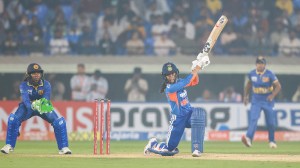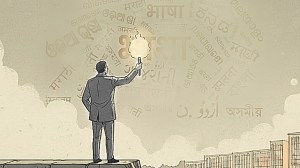Whos afraid of controversy?
Not Bollywood,not when a blazing row and a few goons ensure visibility. Is it any wonder that controversies are now a marketing tool for the media and entertainment industry?
Not Bollywood,not when a blazing row and a few goons ensure visibility. Is it any wonder that controversies are now a marketing tool for the media and entertainment industry?
Ask yourself this. Would you have spent Rs 250 and three hours on a film where a man with a shuffle and a form of autism saves an American town from drowning simply on the strength of Karan Johars conviction,were it not for the high-decibel row that came before it? The hundreds of people who turned up at Mumbais multiplexes to watch My Name is Khan stood up for freedom of expression but perhaps not for good cinema.
The producers are not complaining. Against a production budget of Rs45 crore,it raked in more than Rs150 crore within a week of its release. According to trade expert Taran Adarsh,the film has done impressive business in international markets such as the US,the UK,and the Middle East,that contributed more than 40 per cent to sales. If you do a classic analysis of the content of My Name is Khan ,youd know the film was just about average,yet it did better in terms of sales than films that may have had a stronger content,because it had a strong controversy element associated with it, says Nabankur Gupta,founder and CEO,Nobby Brand Architects,a Mumbai-based branding consultancy. Gupta serves on the boards of The Raymond Group and Pritish Nandy Communications and advises several big companies.
If marketing is the efficient manipulation of attention,controversy,for Bollywood,is the new tool. MNIK wasnt the first film to benefit from a controversy. A recent example was the stand-off between author Chetan Bhagat and producers of 3 Idiots . It got extensive mileage even before its release and the sales of Bhagats book,on which the film was loosely based,also went up.
MARKETING TOOL
Controversies help. Media and entertainment industry professionals today acknowledge that controversies entrench a product in the consumer psyche in a much shorter time. If people in the business are to be believed,controversies are now an important part of marketing campaigns of films,events and other allied businesses. Controversies are a cost-effective and an efficient tool to build a mass buzz in a shorter time,which cant be achieved through traditional advertising campaigns, says Navin Shah,managing director,Entertainment Media Company,a Mumbai-based film marketing firm.
There are,in fact,controversy management teams that explore and exploit ideas that could help attract the medias as well as audiences attention,say people from the industry. For marketers,the most redeeming aspect of controversies is that they deliver massive returns on virtually no investments. Unlike a regular advertising campaign,controversies dont cost much. You only need a good idea that can be blown up. The rest is taken care of by people, says a senior executive of another leading marketing company based in Mumbai. The company helps films find brand and media partners.
The furious growth of digital media and platforms such as Facebook and Twitter has helped. Earlier,controversy campaigners would have to rely on traditional platforms such as print and television and pliable journalists. Now,its much easier to fuel the fire by simply broadcasting some random piece of information on the internet. The rest is taken care of by numerous blogs,communities and twitterati. And come to think of it,all this can be done with minimum costs,unlike the hundreds of crores of rupees that go into making and running a regular advertising campaign, says the executive.
While its difficult to assess the real return or profits that controversies help bring in,its obvious that they do help attract attention and building buzz. Be it rumours of the split between actor Hrithik Roshan and wife Suzanne Khan over the actors reported affair with his co-star Barbara Mori from the film Kites or the controversy over filmmaker Ram Gopal Varmas remixing the national anthem Jana Gana Mana to Jana gana rann for his latest film Rann. Karan Johar,the producer of My Name is Khan had other run-ins last year: Shiv Sena activists found the posters of Kurbaan showing a bare-backed Kareena Kapoor with shirtless Saif Ali Khan obscene and vulgar; Raj Thackeray objected to the use of the word Bombay in another film he produced,Wake Up Sid . Journalist Nandita Puris autobiography of husband Om Puri is also another example of controversy stoking interest in the product put up for sale.
Besides,in todays environment its not too difficult to stir up a row. These days,everybody is ready to take an offence, says Sharmila Tagore,chairperson,Central Board for Film Certification. There has been a sudden emergence of vague organisations who want to stop films on some pretext or the other. Shah Rukh Khans film Billu Barber ,for instance,hit a roadblock following agitations by several barber associations who found the word 8220;barber8221; in the title offensive. Likewise,Rashtriya Teli Rathore Chetna Mahasangh got its 15 minutes of notoriety when it raised a storm against the use of the phrase teli ka tel in the popular song Dhan te nan from Kaminey. The list is endless. Such incidents also help in establishing these organisations, says Tagore. And in case of regular rabble-rousers like Shiv Sena,creating commotion helps in what is described in marketing lingo as refreshing the brand recall.
HANDLE WITH CARE
Some experts say that rabble-rousing is not a good formula for long-term success. Controversies arent a universal publicity tool, says Arvind Sahay,professor of marketing and international business at the Indian Institute of Management,Ahmedabad. They are essentially a vehicle to propagate a product,and more specifically,a product with a small-shelf life. Once the product is past its expiry date and it goes out of sight,it goes out of mind too, he says.
Marketing gurus say brands seeking a long-term relationship with their consumers and those looking for a long-term play in the market,should avoid controversies at any cost. Controversies,in fact,can do irreparable damage to brands that want to build long-lasting bonds with their consumers, says Shripad Nadkarni,founder director of MarketGate Consulting,a Mumbai-based strategic marketing consulting. Nadkarni led Coca Cola Indias marketing brigade for many years and was the man behind its popular Thanda Matlab Coca Cola campaign.
Consumer brands,say experts,cant afford to shake the confidence of their consumers by getting embroiled in controversies. It takes a long time to build brand loyalty and it takes only a small controversy to shatter that confidence. Ask the victims,and they will tell you how difficult it is to win back your loyalists, says Nadkarni.
Beverages companies such as Coca Cola and Pepsi,for instance,found themselves at the receiving end after New Delhi-based The Centre for Science and Environment CSE alleged in 2003 that all their popular brands contained pesticides unsafe for human consumption. This was followed by country-wide protests and campaigns against the two companies. The result was that the brands lost favour with consumers and their sales plummeted by 30-40 per cent.
The two companies could recover only after they launched corporate social responsibility programmes across the country and transformed their brand proposition. Earlier,they were more youthful,frisky and irreverent brands,whereas now they have positioned themselves as family-oriented brands with a responsible face, says Sahay.
Cadburys,Nokia,General Motors and not to forget Tiger Woods are some other brands that have found themselves on the wrong side of consumer attention. And while the ace golfer has publicly apologised for his misconduct,experts say he will have to work a lot harder and reinvent himself to undo the damage caused to Brand Tiger Woods.
With inputs from Alia Allana
- 01
- 02
- 03
- 04
- 05































